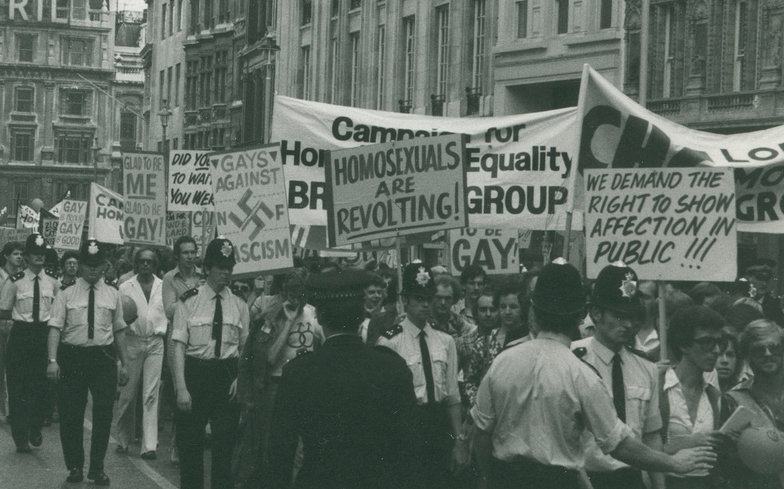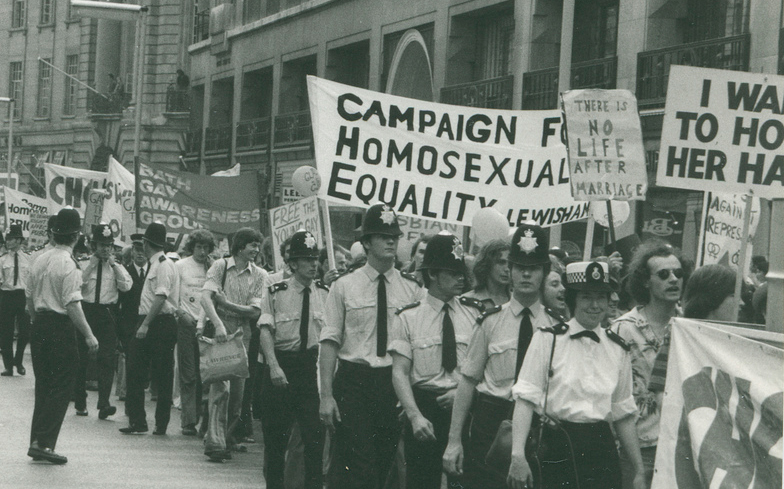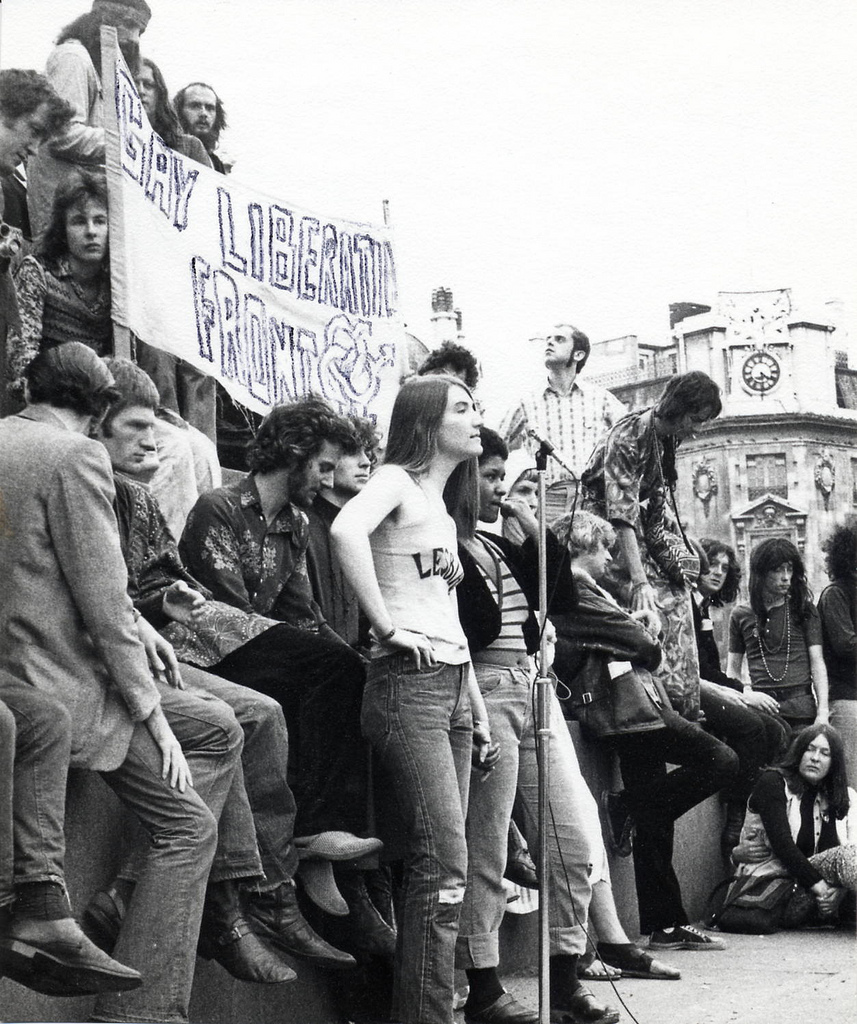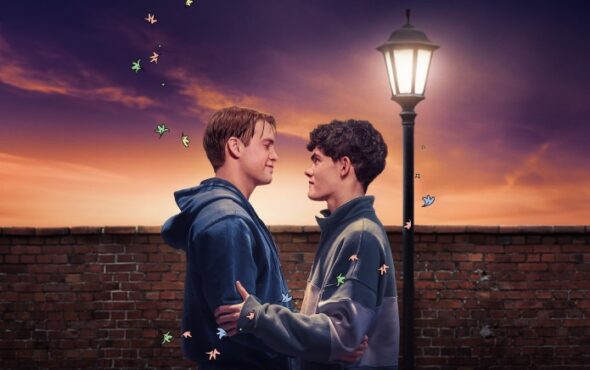
The Gay Liberation Front wanted to change the world in a specific and fundamental way. They didn’t. But you can influence events in ways you don’t intend, and the unintended consequences of their actions helped shifted the world in ways that are still being played out today.
Gay liberation was an American invention. Born out of the struggle for LGBTQ civil rights and acceptance, it burst into the American consciousness during the famous Stonewall riots in New York in 1969. A year later, it crossed the Atlantic and arrived in the UK, via Aubrey Walter and Bob Mellors, who had met at the Revolutionary People’s Constitutional Conference in Philadelphia, which had been sponsored by the Black Panthers.
As a movement, it was a flash in the pan. Gone within a few years of its arrival, it achieved none of its radical ambitions. But its impact was profound, and its legacy felt in the lives of LGBTQ people living in the UK today, many of whom may never have even heard of it.
The 1960s and 1970s were a time of revolutionary change in the Western world. Gay rights, second-wave feminism, technological developments, and cultural transformations convinced many that society was on the verge of a paradigm shift, where the old ways would be swept aside and fundamental change was genuinely possible. This counter culture challenged everything about the world around it, and pitted young against old in a battle of ideas for the future of society.
With the benefit of hindsight we take many of the changes that took place in this period for granted, and often consider them the inevitable development of a stable political and cultural system, but for the protest movements operating at the time, their goal was the radical transformation of society. And the changes they achieved, while not necessarily transformative in the way they had hoped, nevertheless represented some of the biggest social and cultural advancements society had ever seen.

© LSE Library via Flickr
The nineteen people who attended the first GLF meeting in London wanted a fundamental realignment in society’s relationship with homosexuality. Sex between men had only been decriminalised in certain circumstances a few years earlier, and women still suffered the impact of structural sexism in British society. Life then, for gay men and women, was still a struggle and homophobia endemic across the country.
Those first attendees at the LSE in October 1970 drew up a list of basic demands which they published in a leaflet and then distributed around West London to recruit more members. A year later they published their 16-page manifesto.
“Throughout recorded history, oppressed groups have organised to claim their rights and obtain their needs,” it began. “Homosexuals, who have been oppressed by physical violence and by ideological and psychological attacks at every level of social interaction, are at last becoming angry.” It then listed ten ways in which gay people were oppressed – including through family, school, church, media, even self-oppression – and argued that revolutionary change was the only way to fix it. It listed its long term goal: “To rid society of the gender-role system which is at the root of our oppression.”
This was to be achieved by replacing the family unit with the commune, so children could be brought up by the community, free of the influence of gender stereotypes which they believed were doing so much damage to society.
They recognised that this was a long-term goal, however. In the short-term they argued that “the starting point of our liberation must be to rid ourselves of the oppression which lies in the head of every one of us. This means freeing our heads from self-oppression and male chauvinism, and no longer organising our lives according to the patterns with which we are indoctrinated by straight society. It means that we must root out the idea that homosexuality is bad, sick or immoral, and develop a gay pride.”
Pride – for many – now invokes images of parades, corporate sponsorship, and company indexes of inclusivity. It is a celebration of how far we have come and what we have achieved. In the early 1970s, however, Pride was about changing a mindset so ingrained in society that the majority of people believed being gay was wrong, shameful, and while no longer a criminal offence, certainly still a moral one.

© LSE Library via Flickr
So they came out. They lived openly gay lives. They marched in the first Pride parade from Trafalgar Square to Hyde Park. They held public dances, picnics, and awareness groups. They published a magazine. They protested against psychologists, businesses, and religious groups. They famously tackled the right-wing Christian Festival of Light in a brilliantly coordinated sabotage of the opening ceremony – throwing stink bombs, releasing white mice across the floor, unfurling a banner declaring ‘Cliff for Queen’ (Cliff Richard was an attendee at the event), and invading the stage in drag, dressed as nuns, vicars, and bishops. They stood up and were counted.
The group began to splinter in 1972 when the women left, citing the still ingrained sexism of the men. Splits followed between the socialists, activists, counter-culture, and those who just didn’t believe they would be able to change the world in the way they’d hoped.
While it had groups across the UK – particularly in larger towns and cities and especially where there were universities – it remained London-centric. At its height it only represented a few thousand people, and achieved neither legislative change nor the cultural transformation that it aspired to. But despite that, it laid the groundwork for LGBTQ people to live the lives that are now possible in modern Britain.
If you describe yourself as gay, if you joined an LGBTQ society at university, if you called the London Lesbian and Gay Switchboard, if you have been to a Pride parade, or if you ever read Gay News or the magazines that followed it, then you have the GLF to thank for. They made possible the world we now live in, even though they never intended to. They wanted revolution, not evolution, and would likely have disapproved of their own legacy, which has in many cases served to integrate homosexuality into mainstream culture, rather than fundamentally alter it.
But perhaps their most lasting impact is in the way we live our lives as openly gay people. They were pioneers in the development of a gay culture and identity which most of us now take for granted. We define ourselves as gay because they turned the individual struggle with sexuality into a positive and collective process which replaced shame and guilt with pride and openness.
Being open about your sexuality, and having a public discourse and culture to help define who you are, may not seem particularly remarkable in 2018, but that is because gay liberation made it unremarkable.
The Gay Liberation Front wanted to start a revolution in society’s relationship with homosexuality. Despite the huge shifts taking place in society around them, they didn’t manage to. But fortunately for us, their legacy is no less radical.
Related: Offline social networks – how gay men and women met before the internet



